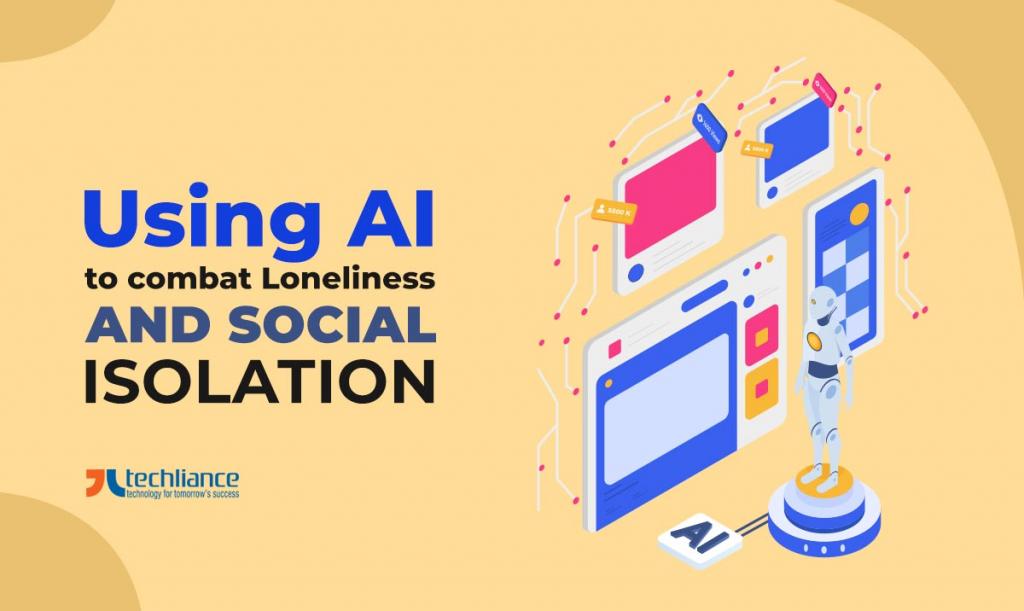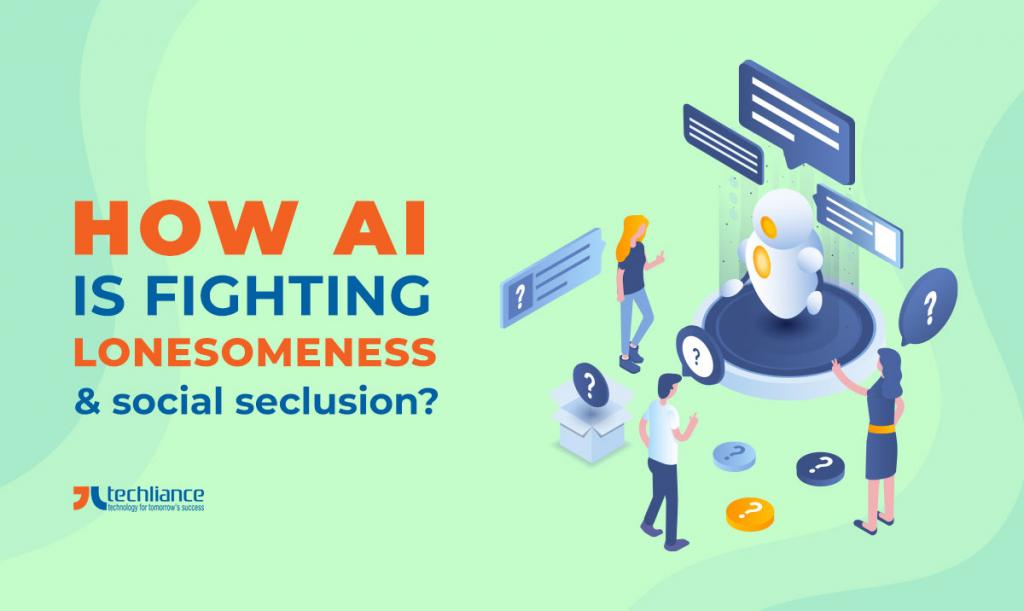Loneliness is a state of mind associated with sadness and anguish. Isolation made itself felt far ahead of the appearance of Coronavirus worldwide and in the United States. Nevertheless, throughout the quarantine restrictions, the role of AI to combat loneliness and social isolation is increasing.
Smart technology is improving, and human attitudes towards it are also changing. We can incorporate AI to combat loneliness and social detachment. Businesses can come up with AI-powered apps to reduce aloneness and make people safely connect with others.
Can AI replace true friends? How can we utilize AI to combat loneliness and social isolation efficiently? Read this article to fight this disorder with AI through 2024.

Statistics about loneliness revealing societal seclusion
COVID-19 has transformed 2020, 2021, and 2022 into unprecedented times for all of us. We had to distance ourselves from society. Some people were comfortable with seclusion during isolation, but others suffered from detachment.
Loneliness has become an invisible epidemic that plagues millions of people around the globe. The Guardian states that loneliness gained momentum even before the appearance of Coronavirus. So, the number of US residents without friends and relatives has doubled in the course of the last 50 years.
For the European countries, the situation is not any better. In the United Kingdom, 75% of healthcare professionals report seeing up to 5 patients suffering from loneliness every day. By recent statistical data, about 7% of the local men and women are lonely (which is around 30 million people).
This feeling of aloneness is both complex and unique for each person. Though, humans feel lonely now and then. But chronic loneliness is a serious health hazard.
Effects of aloneness on human health
Loneliness vs social isolation: what is worse? Social isolation refers to the absence of social connections. While loneliness is a long-term feeling of abandonment and lack of communication. So, loneliness has a more negative impact on human well-being. There are five health factors that loneliness mostly affects.
- Mental health and loneliness are interdependent concepts. When our need for social connections is not met, we fall apart mentally and even physically. If the situation does not change for a long time, loneliness causes depression, feelings of worthlessness, and hopelessness. But the mental condition is not the only thing that loneliness influences.
- In addition to an increased risk of depression, this feeling can trigger anxiety or panic attacks. The research reveals that loneliness is associated with accelerated cognitive impairment in elderly people. Thus, this dreadful feeling may also increase the risk of developing Alzheimer’s disease in old age.
- There is a strong connection between loneliness and sleeping. Men and women who feel socially isolated report poor sleep quality. Scientific studies observe lonely people also experience more sleep problems. These disturbances may have a significant impact on a person’s working efficiency and mental capacity.
- There is an opinion that the feeling of loneliness can harm the immune system. For example, it reduces the activity of natural killer cells. In simple terms, loneliness can weaken the immune system. This is why lonely people are more likely to get sick and their healing and recovery process is significantly slower.
- Recent research suggests that there is a direct biological link between the sense of loneliness and cardiovascular diseases. Higher levels of stress hormones increase the accumulation of cholesterol deposits in blood vessels, raising the risk of cardiovascular ailments. Thus, the longer you are lonely, the more you are prone to hypertension, high cholesterol, and obesity.
How AI is fighting lonesomeness and social seclusion?
Japan is one of the countries with the highest level of loneliness among the population. People having no friends can buy a small black ball showing a hologram of a virtual music star – Hatsune Miku. Users have to purchase it and pay for a monthly subscription for the virtual girlfriend.
In addition, Miku has lovelorn fans who buy it to engage in serious relationships. Some even opt for marriage with the star. One of these guys assures that he loves Miku and perceives her as a living person.
Similarly, there are robots for lonely people who love animals. A nice example of such an invention is a robot of a baby seal known as Paro. It serves as an ordinary animal aimed at battling loneliness and depressive states.
The small artificial seal can see, listen, and feel. Also, it can imitate the sounds of a real baby seal. It is an amazing invention to deal with loneliness.
Besides robotics, virtual AI services have gained popularity in 2021. Globally and in the US, people are increasingly using the best dating sites and different online platforms. Moreover, they are utilizing chatbots to raise their spirits and start feeling better.
One of such applications, Woebot focuses on cognitive behavioral therapy. It observes and examines the mood of a user during the dialog. Based on the gathered information, it helps the interlocutor fix their emotional condition. Users consider the chatbot similar to a reliable old friend, who’s there to support them in the hour of need.

Benefits of communicating with AI avatars
The story of the Japanese man marrying hologram Hatsune Miku demonstrates the main advantage in interacting with an AI friend. It does not devalue or criticize people. Thereby, it allows a person to regain peace of mind and self-confidence that were lost in face-to-face contact with others.
Realize that the peculiarity of loneliness vs depression is that it is more difficult to fight this feeling. For those who are harassed, humiliated, and insulted by society, digital avatars become real salvation from loneliness. This is the only opportunity for full-fledged communication even not so much alive. In addition, AI friends always share the interests of the user, agree with them, and don’t create tensions & conflicts.
Another important advantage of such an interlocutor and friend is that it is always available. This does not lead to an inconvenient time for communication. It makes the AI avatar an excellent option for psychological support for lonely people.
Likewise, it is also salvation for the elderly who are left without attention or receive it in a minimum amount. Artificial intelligence can watch them 24/7 and inform their relatives about any changes (or deterioration) in health conditions. Loneliness feels like nobody cares about you, and AI is a very good helper in this regard.
Intuit Robotics is an innovative company that boasts a great invention for reducing loneliness. They have developed the ElliQ robot, the so-called “helper for happy aging”. It is designed to jollify the owner, and put some music on.
Even, you can play creative games for cognitive brain stimulation. The robot is somewhat akin to a table lamp with a “head” that can move in different directions. ElliQ helps to reduce loneliness in a fun and entertaining way.
Drawbacks of excessive communication with AI avatars
The idea of active communication with AI avatars also has its downsides. Though loneliness hurts and loneliness causes depression. But, people who constantly interact only with a computer have difficulties with further socialization.
They get into the habit of a convenient model of communication with technology. This is quite predictable, as it operates according to programmed algorithms. So, they forget about the peculiarities of living people.
Adequate perception of human beings with all their natural reactions is getting lost. As a result, this can lead to more mental disorders. In particular, an emotionless model of behavior.
Such personality disturbances are caused not only by too much communication with AI-avatars. But also by possible isolation and ignorance of the outside world and society as a whole. Remember that extra reliance on AI avatars is harmful.

Conclusion
The evolution of speech recognition technology to reduce loneliness and social isolation opens up opportunities for various projects. According to experts, countries introducing 5G will soon start using augmented and virtual reality technologies in holographic communications.
Furthermore, the e-health market will see modern chatbots built on AI to combat loneliness. Hence, artificial intelligence is not just a tool that we use for business. It is already an empathetic listener to humans.
Who knows, maybe AI is our friend as well. What do you think? Will you like to try AI technology as a companion?




